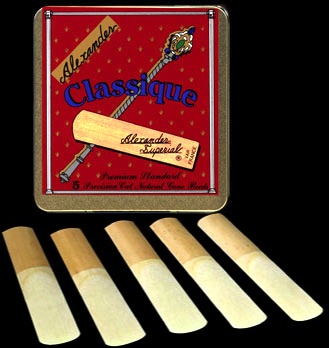In 1997, following the introduction of Superial and
"DC", we felt another line of reeds was needed to address the specific needs of
classical woodwind players or jazz players wanting a bit more resistance and
darkness in their set up than our other models offer.
 Starting with the clarinet model, we tried to conceptualize what
kind of reed we could create that would provide musicians with a wide palette
of expression, and classically grounded performance characteristics...those
that produce a warm, dynamically balanced, sonorously beautiful
tone. Starting with the clarinet model, we tried to conceptualize what
kind of reed we could create that would provide musicians with a wide palette
of expression, and classically grounded performance characteristics...those
that produce a warm, dynamically balanced, sonorously beautiful
tone.
While investigating what direction of design we should pursue, we
knew that there had been a reed made years ago which classical clarinetists
spoke of in almost reverential tones. Although this reed never became as
commercially successful as some of the more "name" brands, it had been in fact
used by some of the top clarinetists in the world, among them some members of
the Chicago Symphony clarinet section. To the lament of many, production ceased
some years back.
We worked on a prototype which was influenced by this
reed's design, but with certain improvements that we felt would actually make
it more suitable to present day musical settings. This same philosophy was also
followed for the saxophone models but with a somewhat different profile design
we felt would bring out the best in that instrument. We also had the advantage
of using more accurate hardness testing and cutting machines so we could
manufacture a much more consistent reed than the original model.
With
testing feedback from some top professional classical clarinetists and
saxophonists, we arrived at the final design of this new reed line christened
"Classique". We went into production for all models and Classique is now being
used not only by classical and concert performers, but any others looking for a
darker tone which this reed's harder tip and heart produce.
In Classique,
we believe we have achieved our goal of capturing the essence of that great
traditional design, but with improvements developed to enhance dynamic
response, clarity and register balance, which we feel produces a "singing"
tonal quality that is definitely classical in its conception. It should also be
noted that a growing number of jazz players seem to enjoy Classique's response
these days as well. |
| Alexander Superial Classique Reeds |
|
|